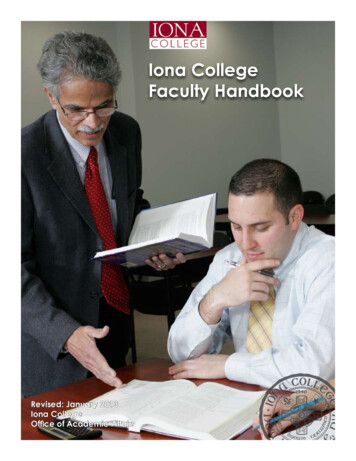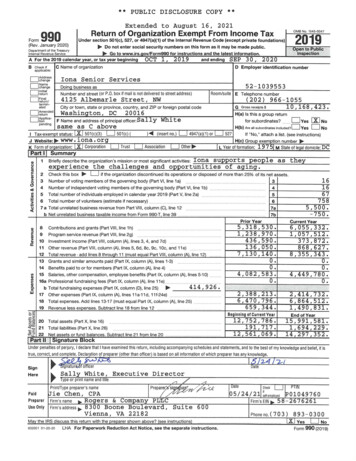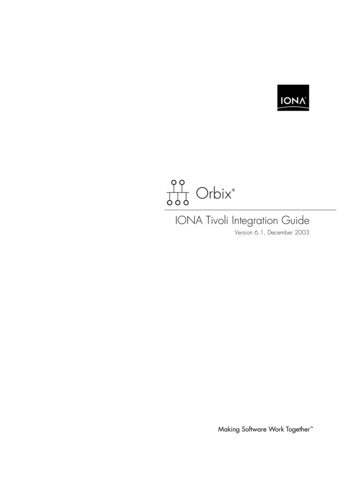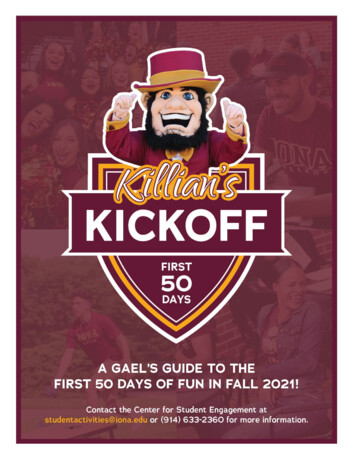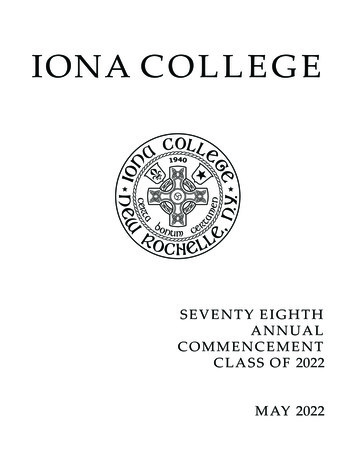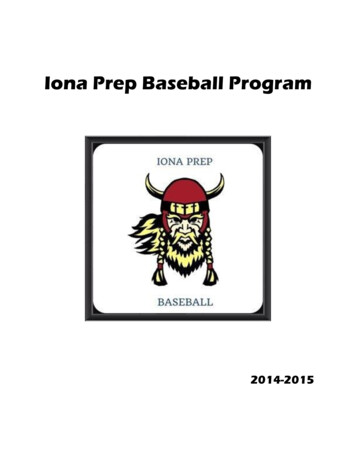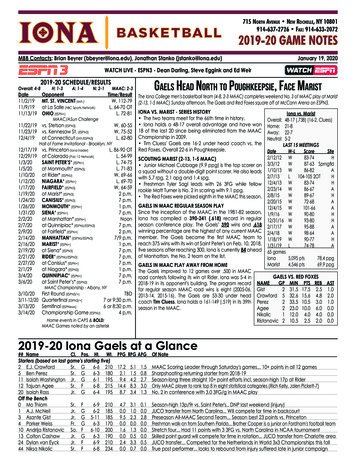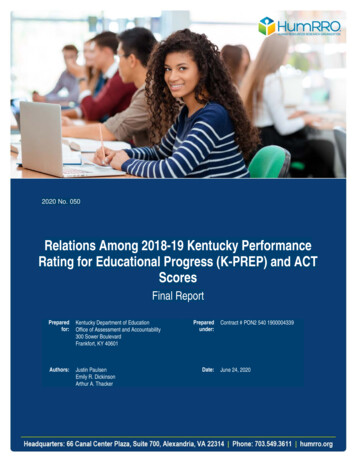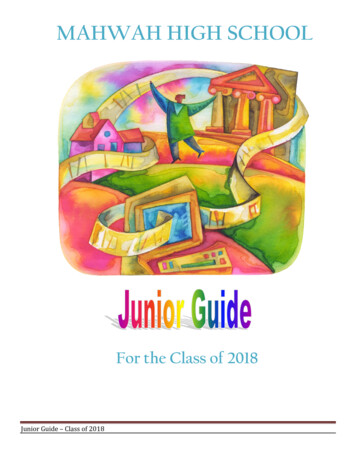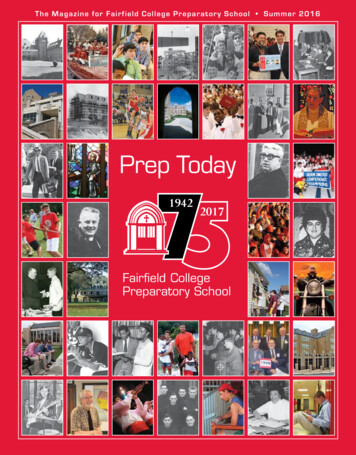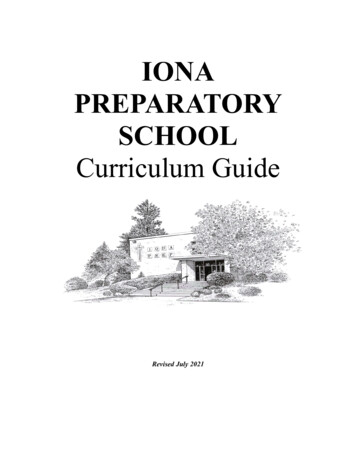
Transcription
IONAPREPARATORYSCHOOLCurriculum GuideRevised July 2021
Course OfferingsDepartment9th10th11thTheologyTheology 1Theology 2Theology 3EnglishSTEP English 1English 1HEnglish 1CPSTEP English 2English 2HEnglish 2 CPAP Capstone SeminarAP English (Lang.)English 3HEnglish 3CPAP Capstone ResearchMathematicsSTEP Alg2/TrigGeometry HAlgebra HAlgebra CPAlgebra II/Trig HGeometry HGeometry CPPre-Calculus HAlgebra II/Trig HAlgebra II/TrigMath 3 CPScienceSTEP PhysicsBiology 1HBiology 1CPChemistry 2HChemistry 2CPAP Physics 1*Science ResearchAP BiologyAP ChemistryAP Physics 1Physics 3HPhysics 3CP*Science Research* This course is inaddition to thescience courserequirement for eachyear.12thTheology 4Faith and LeadershipAP English (Lit.)English 4HEnglish 4CPCreative WritingAP Calculus ABAP Calculus BCCalculus HIntro to CalculusMath 4 CPAP StatisticsAP ComputerScience PrinciplesGame DesignProgrammingAccountingAP BiologyAP ChemistryAP Physics 1AP PsychologyAnatomy &Physiology ogyIntro to Engineering*Science ResearchAP GovernmentEconomics/Gov HEconomics/GovMilitary HistoryItalian 4Spanish 4AP SpanishAP ItalianMandarin 4AP MandarinSocial StudiesAP World HistoryGlobal Studies 1HGlobal Studies 1 CPAP Euro HistoryGlobal Studies 2HGlobal Studies 2 CPAP US HistoryUS History 3HUS History 3 CPWorldLanguagesItalian 1/2Spanish 1/2Mandarin 1Italian 2/3Spanish 2/3Mandarin 2Latin 1(STEP)Italian 3/4Spanish 3/4AP SpanishMandarin 3Half Year &Fine Arts OfferingsExpository WritingHealth 2Speech & Comm.Studio Art 1Music 3Studio Art 2FilmMusic 4Sophomore ServiceJunior ServiceSenior ServiceResearchWriting(STEP)Intro to Latin (STEP)Intro to ComputerScienceIntro to CodingFreshman Service
Physical Ed 9Physical Ed 10Physical Ed 11Physical Ed 12CP refers to college prep courses H refers to honors coursesSTEP Superior Talent Enrichment Program refers to advanced honors coursesIona Preparatory’s SchoolCounseling Program andCollege Selection ProcessA Four-Year Plan“College is a match to be made, not a prize to be won.”Frank Sachs
GOALIona Prep will provide a process whereby students and families will be able to makesuitable and appropriate choices for continuing the student’s post-secondary education.OBJECTIVES1. Parents and students will become thoroughly familiar with the process of collegeadmissions.2. The School Counseling Department, in particular, the college counselors, will designa series of experiences to ensure this familiarity and will provide support andencouragement to families in making a balanced list of college selections.ACTION PLANOver the course of four years at Iona Prep, students and their families will be providedwith educational experiences and services directed toward raising student performancethrough social-emotional and academic interventions and career-college preparedness.The school counselors and college counselors will provide information and counselingthat will assist in making knowledgeable choices during the college selection process.
FRESHMAN YEARThe primary developmental task to be accomplished in the first year is to instill a sense ofbelonging and adjustment to high school life. This is facilitated as school counselors assiststudents in their academic, personal and social development. School counselors willintroduce the value of a college education and its role will be presented through thefollowing activities The role school counselors play in a student’s high school experience.The importance of executive skills like time management, organization and testpreparation in academic success.Freshmen will take a battery of educational tests in October. The results highlightareas of strength and weakness in the basic skills of reading and math and provide anopportunity to assess a student’s placement. (postponed due to COVID19)How to read an Iona Preparatory school report card and transcript.Arranging learning spaces at home for optimal learning and retention.The role diet, sleep and exercise play in relation to memory, mood and focus.Freshmen will have the opportunity to speak to college reps visiting the campus,especially those who visit during the lunch periods.Freshmen will be interviewed by their counselor regarding their academic andfamilial histories, along with their strengths and areas for improvementFreshmen will be encouraged to select extra-curricular activities for enjoyment andenrichment.Freshmen will become familiar with the main areas of a college application tounderstand the elements considered by colleges for admission.Peer Ministry groups are an integral part of the first year experience, allowingfreshmen to ask specific questions of college-bound seniors to gain first-handknowledge of the selection and application process.Freshmen will be apprised of the appropriate SAT Subjects Tests.Freshmen will be encouraged to pursue summer activities that will expand theirexperiences and enhance their education.The school counseling department will deliver a monthly newsletter to parentsregarding transition issues.A College Readiness Night is sponsored by the School Counseling Program in thefall, so parents can learn about early college planning.
SOPHOMORE YEARThe focus in second year is to develop an awareness of self and post-secondaryopportunities. In individual session and Group Guidance classes, school counselors willspecifically introduce the value of a college education through the following activities Students will utilize the Career Interest Survey on the Naviance Program. The resultsof this survey will lead the students to explore possible careers and major fields ofstudy at college.Students will conduct a career search on the Naviance Program to determine the kindof training necessary to accomplish their career goals. They will research collegeprograms that are associated with their goals.Students will explore (in Naviance) the requirements to attend the post-secondaryinstitution that matches their career interests.Students will take the PreACT in October. Counselors will discuss areas of strengthand concern with each student. These scores will be compared to the 9th gradestandardized testsStudents will learn about lifestyle choices which impact health and wellness such as,communication skills, sleep hygiene, diet and exercise, substance use and abuse,video-game and Smartphone addiction, among others.Counselors will discuss the importance of involvement in activities, keeping abreastof grade requirements and a list of significant colleges of interest.A College Readiness Night is sponsored by the School Counseling Program in thefall, so parents can learn about early college planning.Students will utilize the Internet in a college search and contact specified collegeselectronically to determine eligibility requirements.Sophomores will be advised as to appropriate SAT Subject Tests.Sophomores will be encouraged to pursue their interest with summer activities thatexpand their educational experience.
JUNIOR YEARJuniors will be engaged in an eighteen-month process which addresses the selection ofcolleges, matching interests, making the appropriate choices and applying to colleges. Theschool counselors and college counselors will communicate elements of the selection processto students and families emphasizing that it is not a single event but an ongoing enterprisethat takes time and thought to accomplish, highlighted by the following: Counselors will introduce college terms for a clearer understanding of the process.Juniors will take the PSAT in October. The results of this test as well as strategies forimprovement will be communicated to students and parents.The following categories of the selection process are introduced: Major field of study Selectivity level of the college Location Enrollment Activities and special needs Cost and financial aidStudents will re-engage in the Naviance Program to generate a list of colleges forconsideration and research programs offered at those institutions.Juniors will have the opportunity to speak to college reps visiting the campus.Students will create autobiographies and resumes that highlight their abilities andattend an Essay Boot Camp offered during the summerStudents will submit activity sheets, which describe extracurricular activities andpart-time work experiences.Counselors will profile colleges that fit the student’s criteria.Counselors will explain the SAT and its significance in the application process. SATpreparation information will be available for students to enhance their scores. Juniorswill take the SAT exam either in May or June.Juniors and their parents must meet with the College Counselor to outline the initiallist of schools and discuss the planning process.The School Counseling Program will sponsor its own College Fair for students andparents.Juniors will pursue summer activities with the purpose of exploring career oreducational activities.A monthly newsletter to parents which outlines group guidance activities will beissued.A College Readiness Night is sponsored by the School Counseling Program in thefall, so parents can learn about early college planning.
SENIOR YEARIn senior year students will identify reach, target and safety schools for admission. Studentswill apply to their primary choices and make choices that match the student’s and theirfamily’s needs. The college counselors will meet with students and parents to help narrow thechoices.The college counselors will present a College Night for senior parents in earlySeptember.Iona Prep will provide opportunities for seniors to visit colleges to meet withrepresentatives.Seniors will be instructed in the completion of applications and the various modes ofcommunication available to them i.e. electronic applications, Common Applicationsor paper filing.Seniors will have opportunities to practice for college interviews with the collegecounselors and admission representatives.Seniors will be exposed to college admissions representatives during the school day.Seniors and their families will be made aware of scholarship opportunities throughour monthly newsletter.Seniors and their families will be made aware of the procedures involved in obtainingfinancial aid. A Financial Aid session is offered during the College Readiness Nightin the fall.The college counselors will assist the student and his family throughout the decisionprocess to offer information, advice and assistance in meeting procedural tasks.
TheologyGRADE 9First Semester: The Revelation of Jesus Christ in ScriptureSecond Semester: Who is Jesus?Theology 1 is the entry-level course for all freshman students. It is the first year of a TheologyCurriculum for Grades 9-12 within the Archdiocese of NY that is based on the United StatesCatholic Conference of Bishops document: “Doctrinal Elements of a Curriculum Framework forthe Development of Catechetical Materials for Young People of High School Age”. The overallgoal of this curriculum throughout the student’s high school years is to teach and reinforce thecentral teaching of the Christian Faith which is that “Jesus Christ is the center of all we areand all we do” (Archdiocese of NY Theology Curriculum for Secondary Schools).The primary focus of the first semester is “The Revelation of Jesus Christ.” Students will learnthrough the study of Scripture and Tradition how God reveals Himself and why. Thisunderstanding of Divine Revelation culminates with the knowledge that Jesus Christ is God’sComplete Revelation. Students will become familiar with Sacred Scripture-both the Old andNew Testaments through study, interpretation and reflection. The student’s prayer life will beenriched through the introduction of Scriptural based prayer practices such as Liturgy of theHours and Lectio Divina.During the course of the second semester, students will examine the concept of faith as ourresponse to Divine Revelation. The qualities of faith and the relationship between faith andreligion will be discussed. The Mystery of Jesus’ Humanity and Divinity will be explored duringthis second semester course. The Divinity of Jesus is analyzed through study of the Trinity, whileJesus’ humanity is explored by an examination of Jesus’ life as a First Century Palestinian Jew.The study of the life of Jesus allows students to gain a better understanding of what it means tobe human. Through prayer, reflection and discussion of Scripture and Church documents,students will deepen and strengthen their relationship with Jesus. Throughout the semester therewill be an ongoing discussion of what it means for Christians to be disciples of Jesus Christ intoday’s world.GRADE 10First Semester: The Mission of Jesus Christ (The Paschal Mystery)Second Semester: Jesus Christ’s Mission Continues in the ChurchTheology 2, the second year of the United States Catholic Conference of Bishops Curriculumframework, builds on concepts and prayer practices introduced in Religion 1. Throughout theyear, students will be challenged to strengthen and deepen their faith through study, reflectionand prayer on the “Living Word of God”.
The primary focus of the first semester is to help students gain a deeper appreciation for all thatGod has done for humanity through His Son, Jesus Christ. Study of the Paschal Mystery willhelp students reflect and make sense of suffering and evil in the world. A survey of Scripturewill reveal how God promised to redeem His people from the very beginning of SalvationHistory and that the Gospels reveal Jesus Christ is the fulfillment of that promise. Students willsee that the Death and Resurrection of Jesus accomplishes our redemption and how we are calledto live life as disciples of Jesus Christ.In the second semester students will see how Jesus’ Mission lives on through the CatholicChurch. The Church as the “Living Body of Christ” will be the focus of study. Critical readingof selected Scripture passages will help the students see how Christ instituted the Church andhow the Holy Spirit inspires and guides throughout history. Students will come to understand theChurch’s role in the world today and how they contribute to the mission of the Church asdisciples of Jesus Christ.GRADE 11First Semester: Sacraments as Privileged Encounters with Jesus ChristSecond Semester: Life in Jesus ChristTheology 3 is the third year of the United States Catholic Conference of Bishops Curriculumframework that involves the study of the Seven Sacraments and what it means to live life “as aDisciple of Jesus Christ”. In the first semester, students will see how Jesus Christ is encounteredin a special way through the Sacraments. The matter, form and proper disposition of eachSacrament is studied. The Sacrament of the Eucharist will be studied in detail to show how it isthe “source and summit” of a Catholic Christian life.The knowledge of Jesus Christ’s presence throughout our lives via sacraments and liturgy is thestarting point for the second part of the course which deals with morality and the process ofmaking moral decisions. Morality as a subject deals with the rightness and wrongness of actions.This course helps each student to better understand the decision making process, especially interms of the root and motivation of his own choices. Timeless questions are addressed within aCatholic framework: What is good? Why do I do what I do? What consequences do my actionshave? What type of person do I want to be? How do I make informed decisions and choices?What can I do to live out my Christian calling?In discussing these questions, students are encouraged to speak freely and openly but in aconstructive way so that intellectual growth and spiritual/ethical maturation are actively takingplace.Students will explore Catholic Church teachings based on their understanding of Jesus’ teachingsfrom previous years of study. Ultimately the students’ study of what it means to “live a life inJesus Christ” will lead to the understanding that true happiness and peace comes from followingJesus Christ and His plan for us.
GRADE 12Theology 4:First Semester: Ecumenical and Interreligious issuesSecond Semester: Living as a Disciple of Jesus Christ in SocietyOver the course of two semesters, students will be introduced to the major world religions andwill study in greater depth several key themes of Catholic Social Teachings. During the firstsemester, the major world religions will be examined in the light of the Second Vatican Council’sdeclaration that: “the Catholic Church rejects nothing that is true and holy in thesereligions and Christians should “acknowledge, preserve and encourage the spiritual and moraltruths found among non-Christians, as well as their social life and culture.” (NA, 2).In the second semester students will build on the basic concepts of Catholic Social Teachingtaught in Theology 3. As part of this second semester course students will review the roots ofCatholic Social Teaching along with Scriptural roots of Justice and the role of Catholic SocialTeaching in the Modern World. Students will explore in greater detail what it really means forthem as individuals and as members of a community to answer Christ’s call to serve others,especially the poor.Theology 4/Christian Leadership:First Semester: Responding to the Call of Jesus ChristSecond Semester: Living as a Disciple of Jesus Christ in SocietyThis is an adapted Theology 4 course to include lessons on Christian leadership, service andadvocacy. Throughout the course of the year, students will study concepts regarding leadership,Christian Service and the Christian Vocation. This course is taught by three members of CampusMinistry and Theology Department. Students will learn what it means to be a leader. They willlearn about the qualities and characteristics of a good leader through a Christian lens. Topicscovered include: leadership theory, dynamics of leadership, moral decision making, properetiquette and resume writing. Students will gain practical leadership experiences through thefacilitation of underclassmen retreats and creating presentations to develop underclassmenleaders at Iona Preparatory School.Enrolled students in this class will be required to participate in an “externship” program. Inpartnership with the Iona Prep Advancement Office, students will be placed with members of theextended Iona Prep Community (alumni, current parents, etc.) in areas that reflect students’interests giving them real-world experience.As a component of studying leadership, students will explore in greater detail what it means forthem as individuals and as members of a community to answer Christ’s call to serve others,especially the poor. Students will come to understand that Catholic Social Teaching is not just aresponse to social problems but is rooted in the belief that we have a communal social nature andare made in the image of God which means we must all work to ensure all humans are treatedwith the dignity they deserve. During the year, we will examine individual choices and societalchoices that will best allow us to reflect/live Christ’s love for others, especially the poor and
needy. Coursework will involve discussions not only on ways to best serve others but also howstudents can advocate to eliminate the root causes of poverty as students and adults later on inlife.Students will learn how important it is, especially for leaders, to follow a vocation and live a lifeof service for all people. Students will come to understand that there exists a common vocationof Holiness for all as well as each person’s personal vocation. There will be an examination ofthe four states of life that the Church recognizes as a way to live out a personal vocation. Theimportance of prayer, reflection and discernment will be introduced as the chief tools forrecognizing and living out any particular vocation. Service is an important component ofvocations and will be emphasized throughout the course.
EnglishGRADE 9English 1 College Prep - This introductory course focuses on world literature and emphasizesthe structure found in works of various genres. Students express their understanding of what theyread through classroom discussion of plot, characterization and themes and through writingproperly constructed essays. Students study vocabulary and become acquainted with therequirements of the New York State curriculum. Authors studied may include Homer,Shakespeare, Rostand, and Coelho.English 1 Honors - This course focuses on a variety of literature that offers viewpoints,ideologies, and teachings from around the world. To allow students a deeper understanding of thesocial structures that accompany various traditions, there will be an intense focus on both historyand culture. Students study vocabulary and become acquainted with the requirements of the NewYork State curriculum. Authors studied may include Homer, Shakespeare, Rostand, and Coelho.Students will hone literary skills through writing a variety of analytical and structural essays, andthrough creative assignments and journal pieces that will be relative to the readings of the class.Expository Writing - This course is designed to help students to improve their writing skillsthrough the study of the writing process. They will learn to recognize and produce accurategrammatical and syntactical structures at the sentence level, incorporating these into a variety ofin-class writing experiences. They will learn the value of editing and revising their work.Furthermore, students will learn how to write a research paper using proper MLA formatting andcitation.STEP English 1 Honors - This is the most advanced English course offered to freshmen.Students develop higher level reading, writing, critical thinking and interpretative skills throughreading multicultural literature. Students work independently, in small groups, and as a class inthe consideration of the material studied, thereby building individual as well as leadership skills.Students also learn the research process. Authors studied may include Shakespeare, Paton,Gandhi, Narayan.Introduction to Research and Writing – This is a first semester half year course intended fortalented and motivated students committed to serious learning and development of their researchand writing skills. As such, it is required for students in STEP. The students will begin with areview of essential aspects of English grammar. They will practice these elements by frequentshort, graded writing assignments. Students will also be introduced to the formal researchprocess, following MLA Style. The course will culminate in the research and writing of asubstantial research paper that will be due at the end of the semester and serve as the final exam.One-on-one conferencing with the teacher at various stages of the final research paper will play asignificant role in the process.GRADE 10
English 2 College Prep- This course follows the British tradition in literature from theAnglo-Saxon period through the Victorian period. Students will explore various genres,understand the ways in which the literature reflects British society and culture even as itaddresses universal concerns, and formulate comparisons between the eras studied and ourcontemporary perspectives. In addition, this course will continue the development of vocabulary,grammar, and oral and written communication skills begun in freshman year. Authors studiedmay include Chaucer, Shakespeare, Shelley, and Shaw.English 2 Honors - This course follows the British tradition in literature from the Anglo-Saxonperiod through the Victorian period, and is conducted in a more in-depth and analytical way thanis the college prep level. Students will explore various genres, understand the ways in which theliterature reflects British society and culture even as it addresses universal concerns, andformulate comparisons between the eras studied and our contemporary perspectives. Studentswill continue to build vocabulary and oral communication skills. Emphasis is placed uponcomposing clear, sophisticated prose. In addition, this course will continue the development ofvocabulary, grammar, and oral and written communication skills begun in freshman year.Authors studied may include Chaucer, Shakespeare, Shelley, and Shaw.Speech and Communications - This course is designed to enable students to become moreeffective and confident communicators. Through a variety of writing experiences, students willlearn the techniques of creating fluid and compelling prose. In a particular way, students willlearn the components of speech writing, including methods of researching and developing topicsand means by which to implement rhetorical strategies in line with subjects and audiences. Inaddition, students will learn the traits of effective orators, and will gain confidence by making anumber of oral presentations over the course of the semester. In addition, students will hone theirskills of critical listening and critical thinking as they analyze and assess their own work, andthat of their classmates. This course is offered to students at the College Prep and Honors levels.STEP 2 - This is the most advanced English course offered to sophomores, both in terms of thesophistication of the material studied and in the nature of the essays and projects assigned.Students consider the thinking that has brought about societal change as they study literature inits historical context as well as from a philosophical standpoint. Emphasis is placed on writingsophisticated, scholarly, and analytical prose. Students will also conduct research in order toform their own responses to the works studied. Authors studied may include Plato, Chaucer,Shakespeare, Johnson, Shelley, and Gardner.AP Capstone Seminar - AP Seminar is an interdisciplinary course that encourages students todemonstrate critical thinking, collaboration, and academic research skills on topics of thestudent’s choosing. It is offered to Sophomore students in STEP Humanities and STEP STEM.To accommodate the wide range of student topics, typical college course equivalents includeinterdisciplinary or general elective courses.GRADE 11English 3 College Prep- This course familiarizes students with the ways in which events inAmerican history affect literature and culture in the United States. Emphasis is placed on an
understanding of major American works and their authors and continued development ofvocabulary, writing and oral communication skills with respect to the New York Statecurriculum. Authors studied may include Miller, Emerson, Fitzgerald, Frost, and Salinger.English 3 Honors - This course familiarizes students with the ways in which events in AmericanHistory affect literature and culture in the United States. It is conducted in a more in-depth andanalytical way than is the college prep level. Emphasis is placed on an understanding of majorAmerican works and their authors, continued development of vocabulary and oralcommunication skills with respect to the New York State Curriculum, and the composition ofsophisticated, analytical prose. Authors studied may include Miller, Bradbury, Twain, Emerson,Fitzgerald, Frost, and Salinger.Advanced Placement English Language and Composition – This course aligns to anintroductory college-level rhetoric and writing curriculum, which requires students to developevidence-based analytic and argumentative essays that proceed through several stages or drafts.Students evaluate, synthesize, and cite research to support their arguments. Throughout thecourse, students develop a personal style by making appropriate grammatical choices.Additionally, students read and analyze the rhetorical elements and their effects in non-fictiontexts, including graphic images as forms of text, from many disciplines and historical periods.This course follows the prescribed curriculum of the College Board and culminates with the APexam. Selected works may include: In Cold Blood, The Catcher in the Rye, The Great Gatsby.Students also read numerous short nonfiction pieces in keeping with the requirements of the APexam.AP Capstone Research - AP Research is an interdisciplinary course that encourages students todemonstrate critical thinking and academic research skills on a topic of the student’s choosing.This course is offered to Juniors who have successfully completed AP Capstone Seminar. Toaccommodate the wide range of student topics, typical college course equivalents includeintroductory research or general elective courses.GRADE 12English 4 College Prep- This course is designed to develop and refine the students’ written andverbal expression. Through assignments in reading and writing, students continue to enhancetheir critical reading and writing skills, with an emphasis on organization and grammar. Studentsare responsible for both short and long term reading and writing assignments. Students also readseveral poems, plays, and novels throughout the year. Authors studied may include Sophocles,Shakespeare, Thurber, Frost, and Wilson.English 4 Honors - This is a challenging course of study focusing on classic literature – drama,poetry, novels, and short stories. Students will refine their verbal expression through classdiscussion, develop their creative and critical thinking skills, and gain an appreciation of fineliterature. Students will also be expected to demonstrate mastery of literary analysis viaparticipation in a class-sponsored literary blog and through research-based power-pointpresentations. Authors studied may include Sophocles, Shakespeare, Thurber, Frost, and Wilson.
Finally, students will demonstrate superior writing skills via an assortment of literary essays anda research paper.Advanced Placement English Literature and Composition – This course aligns to anintroductory college-level literary analysis course. The course engages students in the closereading and critical analysis of imaginative literature to dee
areas of strength and weakness in the basic skills of reading and math and provide an opportunity to assess a student's placement. (postponed due to COVID19) How to read an Iona Preparatory school report card and transcript. Arranging learning spaces at home for optimal learning and retention.
